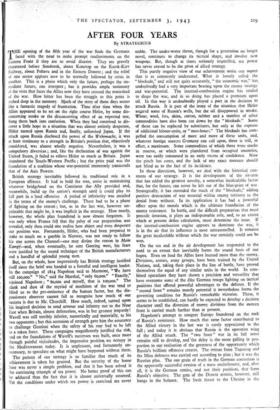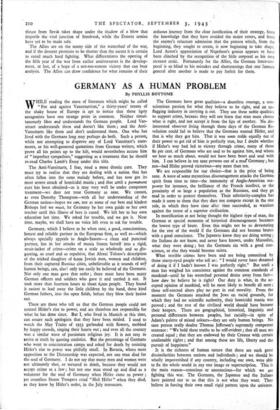AFTER FOUR YEARS
By STRATEGICUS
THE opening of the fifth year of the war finds the Germans faced with the need to make prompt readjustments on the Eastern Front if they are to avoid disaster. They are gravely threatened before Smolensk, about Konotop on the Kursk-Kiev Railway, about Poltava and in the Eastern Donetz ; and the relief of one sector appears now to be normally followed by crisis in another. This is a phase which only the future, perhaps the im- mediate future, can interpret ; but it provides ample testimony of the vista that faces the Allies now they have crossed the watershed of the war. How bitter has been the struggle to this point is etched deep in the memory. Much of the story of those days seems like a fantastic tragedy of frustration. Time after time when the Allies appeared to be set on the right course Hitler, by some dis- concerting stroke or the disconcerting effect of an expected one, flung them back into confusion. When they had contrived to dis- cover a little hope in a situation that was almost entirely desperate, Hitler turned upon Russia and, finally, unleashed Japan. If the attack upon Russia disclosed the po'ver of the Wehrmacht, it was at least testimony to a strength in Britain's position that, objectively considered, was almost wholly negative. Nevertheless, it was a compulsory diversion ; and, like the declaration of war against the United States, it failed to relieve Hitler so much as Britain. Japan inundated the South-Western Pacific ; but the price paid was the foundation of a coalition whose war-potential immensely transcends that of the Axis Powers.
British strategy inevitably followed its traditional role in a European alliance. It had to hold the seas, assist in maintaining whatever bridgehead on the Continent the, Ally provided and, meanwhile, build up the nation's strength until it could play its full part in a land offensive. A period of inferiority was entailed in the terms of the enemy's challenge. There had to be .a phase of fighting on the retreat ; but, as in the last war, however un- palatable that might be, it was implicit in the strategy. How nearly, however, the whole plan foundered is now almost forgotten. It was only when France fell that the palsy of our preparation was revealed, only then- could one realise how abject and even desperate our position was. Fortunately, Hitler, who had been prepared to stake so much on a gamble in Norway, was not ready to follow his star across the Channel—one may divine the reason in Mein Kampf—and, when eventually, he sent Goering west, his fears were justified by the sound technique of the British manufacturers and a handful of splendid young men.
But, on the whole, how impressively has British strategy justified itself since the brief was handed to a forceful and intelligent leader. In the campaign of 1814 Napoleon said to Marmon, " We have still roo,000." "No," said the Marshal, " only 6o,000." " Exactly," rejoined Napoleon ; " 6o,00o and myself, that is too,000." The clank and dust of the myriad of machines of the war tend to blind us to the pre-eminence of the human factor, but the dis- passionate observer cannot fail to recognise how much of our success is due to Mr. Churchill. How much, indeed, turned upon his inspired decision to send armour and infantry out to the Near East when Britain, almost defenceless, was in her greatest jeopardy! Wavell was still terribly inferior, numerically and materially, to his two opponents ; but this accession of strength gave him the assurance to challenge Graziani when the safety of his rear had to be left to a token force. These campaigns magnificently justified the risk, and on the foundations of Wavell's successes was built, once more through painful vicissitudes, the impressive position. we occupy in the Mediterranean today. It is unpleasant, and fortunately un- necessary, to speculate on what might have happened without them.
The pattern of our strategy is so familiar that much of its achievement is taken for granted. But the security of the home base was never a simple problem, and that it has been solved is the continuing triumph of sea power. No better proof of this can be adduced than the fact that it is almost universally assumed. Yet the conditions under which sea power is exercised are never
stable. The under-water threat, though for a generation no longer novel, continues to change its tactical shape, and involve new weapons. But, though at times seriously imperilled, sea power has never ceased to be the pivot of allied strategy.
This purely negative view of our achievement omits one aspect that is as commonly underrated. What is loosely called the "blockade," and still not quite accurately, " the economic war," has undoubtedly had a very important bearing upon the enemy strategy and war-potential. The internal-combustion engine has tended to shape the war, and in so doing has placed a premium upon oil. In this way it undoubtedly played a part in the decision to attack Russia. It is part of the irony of the situation that Hitler secured some of Russia's wells, but the oil disappeared in smoke. Wheat, wool, fats, skins, cotton, rubber and a number of other commodities have also been cut down by the " blockade." Some of these can be replaced by substitutes, but only at the expense of additional labour-units, or "man-hours." The blockade has com- pelled the consumption of more and more of these units, and, whatever foreign sources Germany can call upon, there is still, in effect, a maximum. Some commodities of which there were stocks in reserve, or which were plundered from occupied countries, were too easily consumed in an early excess of confidence. Now the pinch has corn; and the lack of any exact measure should not blind us to the fact of its incidence.
In these directions, however, we deal with the historical con- stants of our strategy. It is the development of the air-arm that has added the greatest novelty, a somewhat incalculable factor that, for the future, can never be left out of the blue-print of war. Strategically, it has extended the reach of the " blockade," adding positive destruction of war material within enemy territory to the denial from without. In its application it has had a powerful effect upon the morale which is the ultimate foundation of the enemy resistance. In battle, and the difficult preparation that must precede invasion, it plays an indispensable role, and, to an extent which at present defies calculation, must determine the issue. If the internal-combustion engine appears to dominate the war, it is in the air that its influence is most untrammelled. It remains the great incalculable without which the war certainly could not be won.
On the sea and in the air development has responded to the need to an extent that inevitably forms the sound basis of our hopes. Even on land the Allies have learned more than the enemy. Divisions, armies, army groups, have been trained by the United Nations, and, taking their place in the line of battle, have proved themselves the equal of any similar units in the world. In com- bined operations they have shown a precision and versatility that have overcome some of the elite German troops 'fighting on tactical positions that offered powerful advantages to the defence. If the " second front" remains merely potential it nevertheless forms the governing condition for Russia's remarkable victories. These, it seems to be established, can hardly be expected to develop a decisive character until the diversion of enemy divisions from the eastern front is carried much further than at present.
Napoleon's attempt to conquer Europe foundered on the rock of Russia's resistance. How much that same factor contributed to the Allied victory in the last war is rarely appreciated to the full ; and today it is obvious that Russia is the operative wing of the Allied attack. The " two front" war in its full sense remains still to develop, and `the delay is the more galling in pro- portion to our realisation of the greatness of the opportunity which Russia's brilliant offensive creates. The retreat from Taganrog and the Mius defences was carried out according to plan ; but it was the Russian plan. The one grain of truth in the German contention is the apparently successful evasion of a mass encirclement, and, after all, it is the German armies, and not their positions, that form Russia's objective. The gate of the Donetz armies, however, still hangs in the balance. The fresh threat to the Ukraine in the thrust from Sevsk takes shape under the shadow of a blow that imperils the vital junction of Smolensk, while the Donetz armies have yet to be made safe.
The Allies are on the sunny side of the watershed of the war, and if the descent promises to be shorter than the ascent it is certain to entail much hard fighting. What differentiates the opening of the fifth year of the war from earlier anniversaries is the develop- ment, at last, of a hope of a not-too-remote victory that can bear analysis. The Allies can draw confidence for what remains of their arduous journey from the clear justification of their strategy, from the knowledge that they have avoided the major errors, and from the enemy's reluctant admission that the pattern which, from the beginning, they sought to create, is now beginning to take shape. Lord Acton's appreciation of Napoleon's genius appears to have been clinched 'by the recognition of the little corporal as his own sternest critic. Fortunately for the Allies, the German lance-cor- poral is so blind to his mistakes and shortcomings that one famous general after another is made to pay forfeit for them.



























 Previous page
Previous page